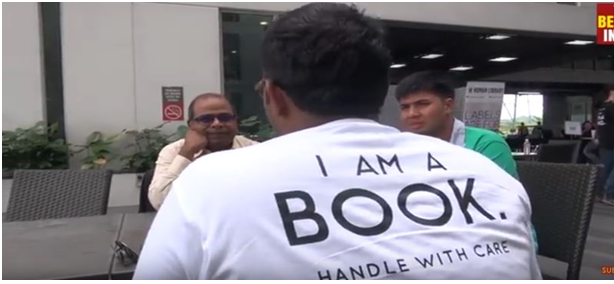People For Pages : India's Human Libraries

With British Council Hyderabad geared up to host the third Human Library on 22nd April 2017, celebrating the “World Book Day,” it’s time to turn towards its chapters in India. While some books like Chain Of Freedom and The Self Loathing Narcissist make a comeback, The Punch Line and many more make their debut.
Stalked shelves greeting in every few inches, with silence for company, libraries have roofed stories. Dressed in pages, libraries have been getaways for seated readers, taking them off their feet. Twist in this long ago tale happened, when Human Library became a reality. Tracing its roots from the first event in 2000 Roskilde Festival, the Indian subcontinent hosted its first Human Library in Indore.

Organised at IIM Indore by Pragati team in collaboration with ‘The Human Library, Indore Chapter’ on 6th November 2016, the event aimed at diluting the prejudices, especially among youth. Tales of Visually Challenged, Autistic, Depression Survivors, Child Abuse Survivors as well as Transgender were some of the titles catalogued for the event. Coordinating the event, the Organiser Amrita Goel, expressed, “It helped us in killing some of our own stereotypes and made us realise how much we assume and generalise.”
Describing it as an eye opener enlightening, for the host as well as the readers, she elaborated on the toil that made the event possible. With three months for screening, followed by training for questions, Human Books were prepped for the final day. When questioned about the similar human library initiatives, she remarked, “It is nice that the concept is catching on in a big way.” What according her sets human library aside from libraries, is the luxury to cross question by “delving in deep into the recesses of the book and experiencing it first hand.” Anirban Ghosh leading Aagaaz Theatre Trust, has been conducting ?????? connection along similar lines amidst the Khirki diversity in Delhi. As he remarks, “Through ?????? connection, we hope to break the communication barriers between them.”
Escalating the initiative further, the City of Perals hosted the second Human Library on 25th March 2017, spearheaded by Harshad Fad and his team. Replacing ruffling pages for human voices, Mr. Harshad intended to “Promote one on one conversation.” People for pages, the Human books as they are called, hold conversation with the readers. Creating a dialogue culture, readers are free to select from the diverse range of breathing books and free to ask questions. Human books after undergoing selective screening interact with the readers for the main event.
Amidst the Art and Cultural Centre, Hyderabad Phoneix Arena, more than 80 readers interacted with 10 Human books. Doorway to opportunity, the session proved so not only for the Human books as well as the readers, as their first experience. “Mutual cooperation and respect is what made the event a reality.” Speaking about the individual sessions that last twenty minutes, Harshad Fad expressed how the future sessions would extend to thirty on clock, by popular demand.
Human libraries have been birth to stories, ones that are personal yet political. Human books, beyond being story tellers, as Harshad Fad remarks “have narrated lives lived and suffered. ”Assorted in categories, while “Chains of Freedom” brought the Indo-Pak border to life through a personal tale, “Break the silence on Child Sexual Abuse” contested by voice abused.

(Photo Courtesy –Google images)
Haleem Khan being read under the title, “A man’s journey to the epitome of grace,” while sharing his love for talking, expressed how the event “rekindled the whole experience.” His journey as a dancer impersonating a woman, interested the “keen and energetic crowd.” Passion and chords of emotion that Mr.Khan shares with Kuchipudi, beyond the story of art was read as a story of “following your heart.” Applauding Harshad Fad and his team, and relishing his part in the innovative initiative he confessed how “one doesn’t expect to be a book.” Interacting with his reader, he counter questioned their doubts, asking , “What is the general feeling towards a man dressed in a female role?” Discussions and dialogues on dance as a feminine art were revisited through a dancer’s story.
Stories have lived beyond time, enchanting and unsettling its readers. Among the democratic heartbeats that form the mosaic India, open mindedness is encouraged. Harshad Fad expresses how, “human libraries aim at achieving this future, devoid of prejudices and stereotypes.” Building on notions of choice and inclusion, the event struggled for change. As Jane Goodall had written,
“Change happens by listening and then starting a dialogue with the people who are doing something you don't believe is right.”
(Video Courtesy- The Better India, This human library is urging people to read humans)




